英语对吃的表达方法
英语中不同的吃的用法
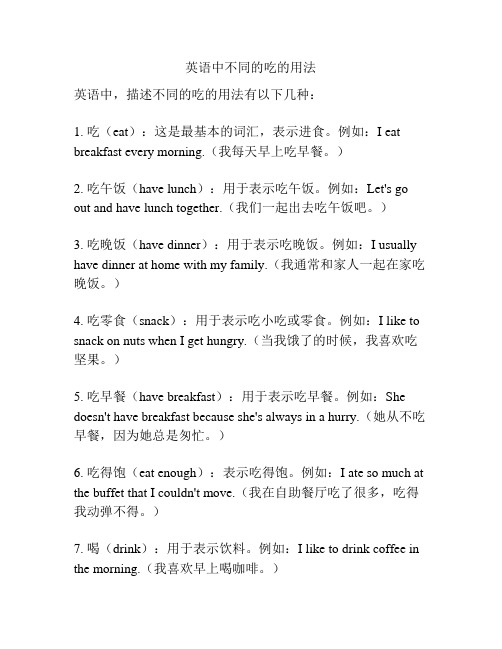
英语中不同的吃的用法英语中,描述不同的吃的用法有以下几种:1. 吃(eat):这是最基本的词汇,表示进食。
例如:I eat breakfast every morning.(我每天早上吃早餐。
)2. 吃午饭(have lunch):用于表示吃午饭。
例如:Let's go out and have lunch together.(我们一起出去吃午饭吧。
)3. 吃晚饭(have dinner):用于表示吃晚饭。
例如:I usually have dinner at home with my family.(我通常和家人一起在家吃晚饭。
)4. 吃零食(snack):用于表示吃小吃或零食。
例如:I like to snack on nuts when I get hungry.(当我饿了的时候,我喜欢吃坚果。
)5. 吃早餐(have breakfast):用于表示吃早餐。
例如:She doesn't have breakfast because she's always in a hurry.(她从不吃早餐,因为她总是匆忙。
)6. 吃得饱(eat enough):表示吃得饱。
例如:I ate so much at the buffet that I couldn't move.(我在自助餐厅吃了很多,吃得我动弹不得。
)7. 喝(drink):用于表示饮料。
例如:I like to drink coffee in the morning.(我喜欢早上喝咖啡。
)8. 尝试(try):用于表示尝试新的食物或菜肴。
例如:I want to try the local cuisine when I travel to a new place.(当我去一个新地方旅行时,我想尝试当地的美食。
)9. 品尝(taste):用于表示细细品尝食物的味道。
例如:The chef asked me to taste the sauce and give my opinion.(厨师让我品尝酱汁并给出意见。
吃饭常用英语口语

吃饭常用英语口语在日常生活中,无论是在餐厅用餐还是与朋友聚会,掌握一些基本的英语口语表达是非常有用的。
以下是一些吃饭时常用的英语口语表达:1. 点餐时,你可以说:- "Excuse me, may I see the menu, please?"(打扰一下,我可以看一下菜单吗?)- "I'd like to order, please."(我想点餐。
)- "Could you recommend something?"(你能推荐一些菜吗?)2. 如果你对食物有特殊要求,可以说:- "I'm allergic to seafood."(我对海鲜过敏。
)- "I'm a vegetarian."(我是素食者。
)- "Can I have it without garlic, please?"(可以不加大蒜吗?)3. 当服务员上菜时,你可以表示感谢:- "Thank you for bringing the food."(谢谢你上菜。
)- "This looks delicious."(看起来很好吃。
)4. 用餐时,如果你需要额外的服务,可以说:- "Could I have some more water, please?"(可以再给我一些水吗?)- "I'd like a refill, please."(我想要续杯。
)- "Could you pass the salt, please?"(可以递给我盐吗?)5. 如果你对食物满意,可以表达赞赏:- "This is really good."(这个真的很好吃。
)- "The food is excellent."(食物非常出色。
吃用英文怎么说

吃用英文怎么说吃是指用手或工具(筷子,叉子,勺子等)把食物送进口腔,经过牙齿咀嚼后下咽经食道管进入胃里,再由消化系统完成整个消化过程。
那么你知道吃用英语怎么说吗?下面来学习一下吧。
吃英语说法1:eat吃英语说法2:have one's meals吃的英语例句:我其实并没有注意到自己在吃什么。
I didn't really notice what I was eating.你吃过晚饭了吗?Have you had your supper?只要不吃得太多,你可以吃任何东西。
You may eat anything, so long as you don't eat too much.我怎么吃都不胖。
I could eat what I liked without getting fat.偷吃而不被人发现很有趣。
It is fun eating by stealth without being found.你隔多久就在外面吃一次饭?How often do you eat out?过了一小会儿,他们坐下来吃东西。
A short time later they sat down to eat.你吃糖果、蛋糕或甜点吗?Do you eat sweets, cakes or sugary snacks?他已经习惯在外面吃饭了。
He is used to eating out all the time.我一吃完晚饭就来这里了。
I came here immediately after having my supper.还能吃海鲜和椰子,我们想吃多少就吃多少。
And we can eat seafood and coconuts as much as we want.你所吃的要按分两吃,每日二十舍客勒;按时而吃。
Weigh out twenty shekels of food to eat each day and eat it at set times.蛇吃蟾蜍,蟾蜍吃昆虫,昆虫吃绿叶。
英语中各种各样的“吃法”
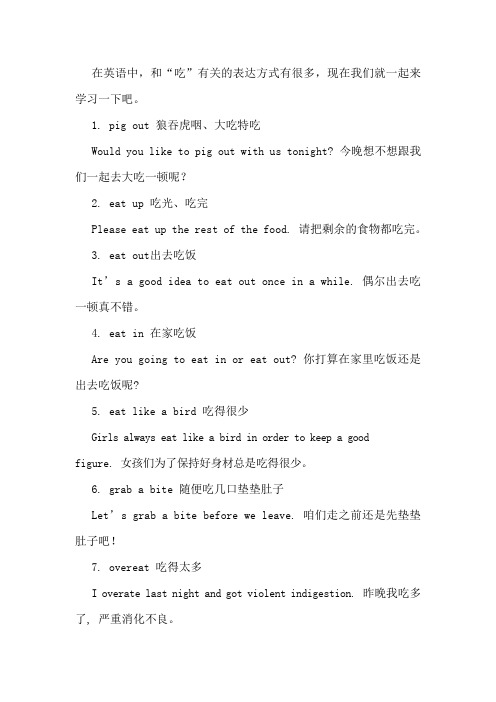
在英语中,和“吃”有关的表达方式有很多,现在我们就一起来学习一下吧。
1. pig out 狼吞虎咽、大吃特吃Would you like to pig out with us tonight? 今晚想不想跟我们一起去大吃一顿呢?2. eat up 吃光、吃完Please eat up the rest of the food. 请把剩余的食物都吃完。
3. eat out出去吃饭It’s a good idea to eat out once in a while. 偶尔出去吃一顿真不错。
4. eat in 在家吃饭Are you going to eat in or eat out? 你打算在家里吃饭还是出去吃饭呢?5. eat like a bird 吃得很少Girls always eat like a bird in order to keep a goodfigure. 女孩们为了保持好身材总是吃得很少。
6. grab a bite 随便吃几口垫垫肚子Let’s grab a bite before we leave. 咱们走之前还是先垫垫肚子吧!7. overeat 吃得太多I overate last night and got violent indigestion. 昨晚我吃多了, 严重消化不良。
8. swallow 吞咽He contracted his brows and swallowed the medicine down. 他皱了皱眉头, 然后一口把药吞了下去。
9. chew 咀嚼Old people often chew the food thoroughly before swallowing it. 老年人总是会细细咀嚼,然后才把食物咽下去。
10. be on a diet 节食The doctor says that I’ve got to go on a diet. 医生说我得节食。
英语中吃的各种表达

英语中吃的各种表达Eating in English: A Diverse and Colorful Vocabulary Journey.In the vast and intricate landscape of English vocabulary, the subject of "eating" holds a particularly rich and varied territory. From the everyday casual expressions to the formal and culture-specific terms, English provides us with an array of words and phrases to describe the diverse acts, processes, and experiences surrounding food and eating. This article delves into the various expressions related to eating in English, exploring their origins, meanings, and cultural significance.Let's start with the most basic and fundamental verb: "to eat." This simple yet versatile word serves as the foundation for many other expressions related to eating. "I ate my lunch at school" is a straightforward statement, yet it encapsulates the essence of consuming food. However, English offers a plethora of alternatives to "eat" that canbe used to convey a more specific or nuanced meaning.For instance, "to dine" is a more formal term for eating a meal, often associated with social occasions or special events. "We dined at the finest restaurant in the city" suggests a level of elegance and sophistication. Similarly, "to sup" refers to having a light evening meal, often used in historical or literary contexts.When describing the quantity or manner of eating, English has an equally robust vocabulary. "To devour" implies eating with great hunger or enthusiasm, as in "She devoured the entire pizza in one sitting." On the other hand, "to nibble" suggests eating in small, dainty bites, often associated with delicacy or refinement.The English language also offers a range of verbs that describe the specific type of food being consumed. "To munch" is often used to describe eating something crunchy or solid, like a sandwich or apple. "She munched on her sandwich as she walked to work." Conversely, "to sip" is associated with drinking liquids slowly and carefully, asin "He sipped his coffee while reading the newspaper."Moving beyond verbs, English has a wealth of nouns and adjectives related to eating. "Meal" is a general term for any of the main eating occasions of the day, such as breakfast, lunch, or dinner. However, there are also more specific terms like "brunch" (a combination of breakfast and lunch) and "supper" (an evening meal, often used in British English).Adjectives related to eating can describe the quality, taste, or manner of food consumption. "Delicious" and "tasty" are common adjectives used to describe food that is pleasing to the palate. "Hearty" describes food that is substantial and filling, while "light" suggests a meal that is not heavy or indulgent.Phrases and idioms related to eating also play an important role in English conversation. "Eat your heart out" is an expression used to tease someone who is jealous or envious, while "eat humble pie" refers to apologizing or admitting one's mistakes. These idioms add color and nuanceto our language, allowing us to express complex emotions and situations in a concise and memorable way.Cultural references and historical context also play a significant role in English eating vocabulary. "High tea"is a traditional British afternoon meal that typically includes tea, sandwiches, and pastries. "All-you-can-eat" buffets are a modern-day phenomenon, originating from Japanese cuisine, that allows diners to eat as much as they want for a fixed price.In conclusion, the English language offers a vast and varied vocabulary to describe the acts, processes, and experiences surrounding food and eating. From verbs like "to dine" and "to munch" to nouns like "meal" and "supper," and from adjectives like "delicious" and "hearty" to phrases and idioms like "eat your heart out" and "high tea," English provides us with a rich and diverse set of tools to express our thoughts and feelings about food and eating. Whether we are describing a casual lunch with friends or a formal dinner party, English has the rightword or phrase to convey our meaning precisely and colorfully.。
关于吃的英文句子

关于吃的英文句子民以食为天,我们的日常话题总是离不开吃,有时谈论美食也是一种享受。
今天店铺在这里为大家分享一些关于吃的英文句子,欢迎大家阅读!关于吃的英文句子1. Let's grab something to eat!我们随便找点东西饱腹吧!Grab something to eat 就是指这一餐随便解决,可能就是到速食店买个whopper、coke 吃吃。
如果到餐厅去吃饭就不能说grab something to eat. Grab 是说去拿个东西,不一定是拿食物,例如你可以说 Let's get back to grab my camera! 但是一般而言,应用最广的还是 grab something to eat.老美还教过我一个用法Let's go get some grub. 这个意思和grab something to eat 是一样的,只不过 grub 是比较俚语的用法。
2. Cream or sugar?要奶精还是糖?如果你去买杯咖啡,或是在飞机上用餐时点咖啡,别人就可能会问你Cream or sugar? 以我们的习惯通常是两个都要,这时就回答both 就好了。
还有我也听过老美回答 please。
这两种说法都可以,但Please 的用法更广,比如说人家问你 Do you like a glass of water? 你回答please 就等于yes. 而且感觉上更礼貌些。
再补充一点,如果你要的咖啡是不要奶精的,那么你可以说I want it black. Black coffee 就是不加奶精的咖啡。
如果你是去速食店点咖啡,有时候你答 both 之后,店员还会问你How many? 因为他们的糖和奶精都是一包一包或一盒一盒的,一般我都是各要两包。
Two sugars and two cream.3. Yuck!好难吃!吃到很难吃的东西,第一个反应就是 yuck! 或是 It's yucky. 记得说这个 yuck 要拖的长长的,让它读起来像是 yuuuuuuuck 听起来才会像。
英语对吃的表达方法

英语对吃的表达方法英语对吃的表达方法一看到"吃",人们自然而然想到的英语对应词就是"eat",但是,这个简单的"吃"的`意义绝不是一个"eat"就能完全表达的。
除了eat之外,还应该根据不同的情景和意义给予恰当的表达,以下是店铺整理的英语对吃的表达方法,供大家参考借鉴,希望可以帮助到有需要的朋友。
1.译作take或have。
The patient can't take food yet.病人还不能吃饭。
We are having dinner now.我们现在正在吃晚饭。
2.译作dine,feed,taste,touch,graze等词。
She invites me to dine with her tomorrow.她邀请我明天和她一起吃饭。
Have you fed yet?你吃饭了吗?He hasn't touched /tasted food for two days.他两天没吃东西了。
The horses were grazing quietly in the field.马群正在田野里静静地吃草。
3.译作like,love,prefer,enjoy,care for, be fond of等。
Would you like `ice-cream`?你想吃冰淇淋吗?She loves bananas.她爱吃香蕉。
Southerners prefer rice while northerners prefer noodles.南方人喜欢吃米饭而北方人喜欢吃面条。
He is enjoying his dinner.他正津津有味地吃晚饭。
Tom doesn't care for meat.汤姆不怎么喜欢吃肉。
Ants are fond of sweet food.蚂蚁喜欢吃甜食。
4.译作feed on,live on等短语动词。
吃饭的常用英语口语

吃饭的常用英语口语关于吃饭的常用英语口语吃饭时常用的英语表达有哪些你知道吗?你对吃饭时常用的英语表达了解吗?下面是店铺帮大家整理的吃饭的常用英语口语,仅供参考,大家一起来看看吧。
1、Hungry? 饿了吗?2、I‘m hungry 我饿了3、I’m feeling a little bit peckish 我肚子有点饿了4、I‘m famished! 我饿死了!5、I’m starving! 我饿死了!6、I‘m starved! 我饿死了!7、I’m starved to death! 我饿死了!8、I could eat a horse! 我饿极了(我连一匹马都能吃掉)!9、I‘m not hungry at all. 我一点儿也不饿。
10、We have some snacks 吃点儿点心吧11、Where are the snacks? 点心在哪儿?12、They’re in the cupboard 在碗橱里13、Is it time for dinner yet? 该吃晚饭了吧?14、Is dinner ready? 晚饭做好了吗?15、Have you made dinner? 晚饭做好了吗?16、Have you got supper ready? 晚饭做好了吗?17、Oh,it‘s not. But I’m almost ready here. 还没有,不过快做好了。
18、What‘s good tonight? 今晚做什么好吃的了?19、What would you like for dinner? 晚饭你想吃什么?20、What do you want to eat for dinner? 晚饭你想吃什么?21、What should I fix for dinner? 晚饭做什么好呢?22、What should I make for dinner? 晚饭做什么好呢?23、What should I cook for dinner? 晚饭做什么好呢?24、What should I whip up for dinner? 晚饭做什么好呢?25、What’s for dinner tono ght? 今天晚饭吃什么?26、What‘s for dinner? 晚饭吃什么?27、What would you like for dinner? 晚饭你想吃什么?28、What do you feel like? 你想吃点什么?29、I like to eat hamburgers. 我喜欢吃汉堡。
英语中不同的吃的用法

英语中不同的吃的用法在英语中,有很多词汇可以用来描述吃的行为或者各种吃的东西。
以下是一些常见的用法和词汇:1.吃饭:have a meal、 eat a meal、 dine、 have a bite、grab a bite;例如:I'm going to have dinner at my friend's house tonight.(今晚我要去朋友家吃饭。
)2.吃早餐:have breakfast、 eat breakfast;例如:I usually have breakfast at 7 a.m.(我通常在早上7点吃早餐。
)3.吃午餐:have lunch、 eat lunch;例如:Let's eat lunch together at the café.(我们一起在咖啡馆吃午饭吧。
)4.吃晚餐:have dinner、 eat dinner;例如:We always eat dinner as a family.(我们一家人都会一起吃晚饭。
)5.吃零食:have a snack、 eat a snack;例如:I like to have a snack in the afternoon.(我喜欢在下午吃点小吃。
)6.吃甜点:have dessert、 eat dessert;例如:Don't forget to save some space for dessert.(别忘了为甜点留点空间。
)7.吃水果:have fruit、 eat fruit;例如:I try to eat fruit every day for a healthy diet.(我为了健康饮食每天都会吃水果。
)8.吃雪糕:have ice cream、 eat ice cream;例如:Let's go out for ice cream after dinner.(晚饭后我们一起去吃冰淇淋吧。
have和eat的用法与区别
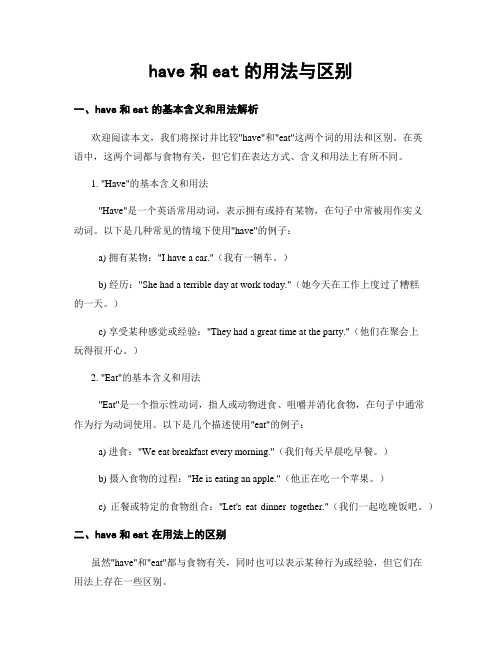
have和eat的用法与区别一、have和eat的基本含义和用法解析欢迎阅读本文,我们将探讨并比较"have"和"eat"这两个词的用法和区别。
在英语中,这两个词都与食物有关,但它们在表达方式、含义和用法上有所不同。
1. "Have"的基本含义和用法"Have"是一个英语常用动词,表示拥有或持有某物,在句子中常被用作实义动词。
以下是几种常见的情境下使用"have"的例子:a) 拥有某物:"I have a car."(我有一辆车。
)b) 经历:"She had a terrible day at work today."(她今天在工作上度过了糟糕的一天。
)c) 享受某种感觉或经验:"They had a great time at the party."(他们在聚会上玩得很开心。
)2. "Eat"的基本含义和用法"Eat"是一个指示性动词,指人或动物进食、咀嚼并消化食物,在句子中通常作为行为动词使用。
以下是几个描述使用"eat"的例子:a) 进食:"We eat breakfast every morning."(我们每天早晨吃早餐。
)b) 摄入食物的过程:"He is eating an apple."(他正在吃一个苹果。
)c) 正餐或特定的食物组合:"Let's eat dinner together."(我们一起吃晚饭吧。
)二、have和eat在用法上的区别虽然"have"和"eat"都与食物有关,同时也可以表示某种行为或经验,但它们在用法上存在一些区别。
1. 动词性质不同:"Have"是一个实义动词,可以表示拥有、持有、经历或享受等含义;而"eat"是一个行为动词,主要描述进食或咀嚼消化食物的行为。
怎么用英语表达好吃
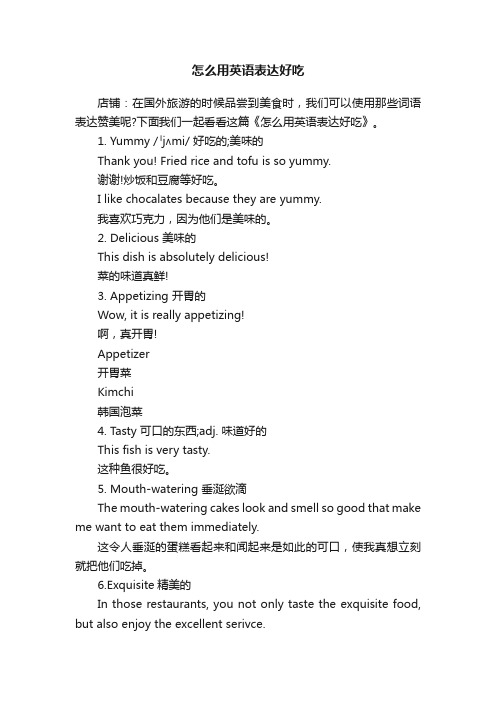
怎么用英语表达好吃店铺:在国外旅游的时候品尝到美食时,我们可以使用那些词语表达赞美呢?下面我们一起看看这篇《怎么用英语表达好吃》。
1. Yummy /ˈjʌmi/ 好吃的;美味的Thank you! Fried rice and tofu is so yummy.谢谢!炒饭和豆腐等好吃。
I like chocalates because they are yummy.我喜欢巧克力,因为他们是美味的。
2. Delicious 美味的This dish is absolutely delicious!菜的味道真鲜!3. Appetizing 开胃的Wow, it is really appetizing!啊,真开胃!Appetizer开胃菜Kimchi韩国泡菜4. Tasty 可口的东西;adj. 味道好的This fish is very tasty.这种鱼很好吃。
5. Mouth-watering 垂涎欲滴The mouth-watering cakes look and smell so good that make me want to eat them immediately.这令人垂涎的蛋糕看起来和闻起来是如此的可口,使我真想立刻就把他们吃掉。
6.Exquisite精美的In those restaurants, you not only taste the exquisite food, but also enjoy the excellent serivce.在一些餐馆里,你不仅仅是品尝精美的食物,也享受了优质的服务。
公众号:墨尔本英语学习。
英语口语:如何表达各种吃早餐
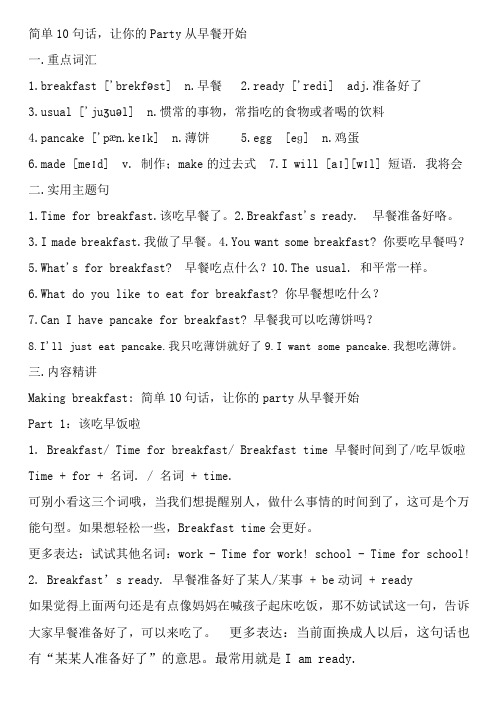
简单10句话,让你的Party从早餐开始一.重点词汇1.breakfast ['brekfəst] n.早餐2.ready ['redi] adj.准备好了ual ['juʒuəl] n.惯常的事物,常指吃的食物或者喝的饮料4.pancake ['pæn.keɪk] n.薄饼5.egg [eɡ] n.鸡蛋6.made [meɪd] v. 制作;make的过去式7.I will [aɪ][wɪl] 短语. 我将会二.实用主题句1.Time for breakfast.该吃早餐了。
2.Breakfast's ready. 早餐准备好咯。
3.I made breakfast.我做了早餐。
4.You want some breakfast? 你要吃早餐吗?5.What's for breakfast? 早餐吃点什么?10.The usual. 和平常一样。
6.What do you like to eat for breakfast? 你早餐想吃什么?7.Can I have pancake for breakfast? 早餐我可以吃薄饼吗?8.I'll just eat pancake.我只吃薄饼就好了9.I want some pancake.我想吃薄饼。
三.内容精讲Making breakfast: 简单10句话,让你的party从早餐开始Part 1:该吃早饭啦1. Breakfast/ Time for breakfast/ Breakfast time 早餐时间到了/吃早饭啦Time + for + 名词. / 名词 + time.可别小看这三个词哦,当我们想提醒别人,做什么事情的时间到了,这可是个万能句型。
如果想轻松一些,Breakfast time会更好。
更多表达:试试其他名词:work - Time for work! school - Time for school!2. Breakfast’s ready. 早餐准备好了某人/某事 + be动词 + ready如果觉得上面两句还是有点像妈妈在喊孩子起床吃饭,那不妨试试这一句,告诉大家早餐准备好了,可以来吃了。
用英语询问想吃的东西的几种方式-教您快速掌握高频英语句式
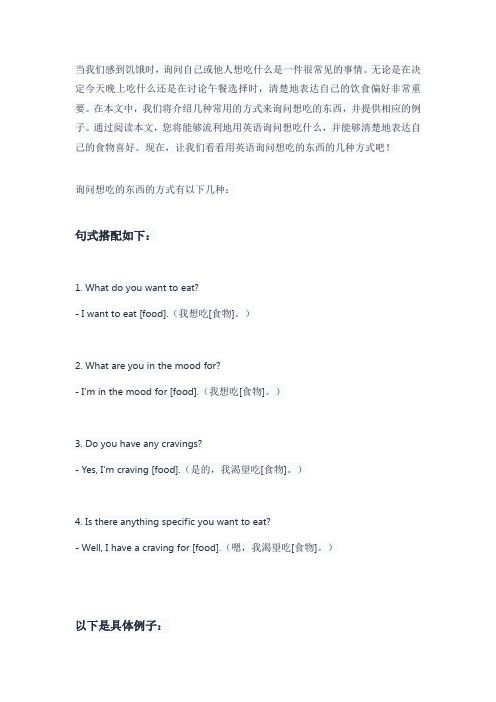
当我们感到饥饿时,询问自己或他人想吃什么是一件很常见的事情。
无论是在决定今天晚上吃什么还是在讨论午餐选择时,清楚地表达自己的饮食偏好非常重要。
在本文中,我们将介绍几种常用的方式来询问想吃的东西,并提供相应的例子。
通过阅读本文,您将能够流利地用英语询问想吃什么,并能够清楚地表达自己的食物喜好。
现在,让我们看看用英语询问想吃的东西的几种方式吧!询问想吃的东西的方式有以下几种:句式搭配如下:1. What do you want to eat?- I want to eat [food].(我想吃[食物]。
)2. What are you in the mood for?- I’m in the mood for [food].(我想吃[食物]。
)3. Do you have any cravings?- Yes, I’m craving [food].(是的,我渴望吃[食物]。
)4. Is there anything specific you want to eat?- Well, I have a craving for [food].(嗯,我渴望吃[食物]。
)以下是具体例子:1. What do you want to eat for dinner?- I want to eat sushi.(我想吃寿司。
)2. What are you in the mood for tonight?- I’m in the mood for pizza.(我今晚想吃披萨。
)3. Do you have any cravings at the moment?- Yes, I’m craving chocolate cake.(是的,我想吃巧克力蛋糕。
)4. Is there anything specific you want to eat for lunch?- Well, I have a craving for tacos.(嗯,我渴望吃塔可斯。
中午吃了套餐的英语
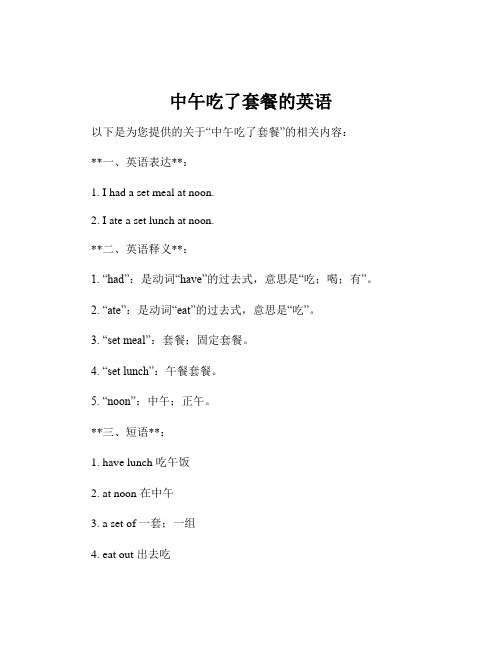
中午吃了套餐的英语以下是为您提供的关于“中午吃了套餐”的相关内容:**一、英语表达**:1. I had a set meal at noon.2. I ate a set lunch at noon.**二、英语释义**:1. “had”:是动词“have”的过去式,意思是“吃;喝;有”。
2. “ate”:是动词“eat”的过去式,意思是“吃”。
3. “set meal”:套餐;固定套餐。
4. “set lunch”:午餐套餐。
5. “noon”:中午;正午。
**三、短语**:1. have lunch 吃午饭2. at noon 在中午3. a set of 一套;一组4. eat out 出去吃**四、单词**:1. lunch 午餐2. meal 一餐;一顿饭3. noon 中午;正午4. set 一套;一组;固定的**五、用法**:1. “have”和“eat”都可以表示“吃”,但“have”更常用,且比较正式。
2. “at noon”是一个固定短语,表示“在中午”。
3. “set meal”和“set lunch”中的“set”表示“固定的;一套的”。
**六、双语例句**:1. I had a set meal for lunch at noon. 中午我午餐吃了一份套餐。
2. He ate a set lunch at noon and felt full. 他中午吃了一份套餐,感觉饱了。
3. We usually have a set meal at noon to save time. 我们通常在中午吃套餐以节省时间。
4. At noon, she had a delicious set meal. 中午,她吃了一顿美味的套餐。
5. Did you have a set meal at noon today? 你今天中午吃套餐了吗?6. I don't want to cook at noon. Let's eat a set meal. 中午我不想做饭。
询问对方想吃什么句型

询问对方想吃什么句型
询问对方想吃什么句型是我们日常生活中经常用到的一种表达方式。
这种句型通常用于询问对方的饮食喜好,以便为对方准备食物或选择餐厅。
在英语中,询问对方想吃什么通常可以用"What would you like to eat?"或"What do you feel like eating?"等句型表达。
这些句型都很简单易懂,可以帮助我们迅速了解对方的饮食喜好。
在中文中,询问对方想吃什么通常可以用"你想吃什么?"或"你有什么想吃的吗?"等句型
表达。
这些句型也很常见,可以帮助我们更好地了解对方的口味。
无论是英语还是中文,询问对方想吃什么都是一种非常实用的表达方式。
它可以帮助我们更好地了解对方的需求,为对方提供更好的服务。
因此,我们应该在日常生活中多多使用这种句型,以便更好地与他人沟通。
- 1、下载文档前请自行甄别文档内容的完整性,平台不提供额外的编辑、内容补充、找答案等附加服务。
- 2、"仅部分预览"的文档,不可在线预览部分如存在完整性等问题,可反馈申请退款(可完整预览的文档不适用该条件!)。
- 3、如文档侵犯您的权益,请联系客服反馈,我们会尽快为您处理(人工客服工作时间:9:00-18:30)。
英语对吃的表达方法中“吃”的表达方法一看到“吃”,人们自然而然想到的对等词就是“eat”,但是,这个简单的“吃”的意义决不是一个“eat”就能完全表达的。
除了eat之外,还应该根据不同的情景和意义给予恰当的表达。
常见的表达法如下:1.译作take或have。
The patient can't take food yet.病人还不能吃饭。
We are having dinner now.我们现在正在吃晚饭。
2.译作dine,feed,taste,touch,graze等词。
She invites me to dine with her tomorrow.她邀请我明天和她一起吃饭。
Have you fed yet?你吃饭了吗?He hasn't touched /tasted food for two days.他两天没吃东西了。
The horses were grazing quietly in the field.马群正在田野里静静地吃草。
3.译作like,love,prefer,enjoy,care for, be fond of等。
Would you like `ice-cream`?你想吃冰淇淋吗?She loves bananas.她吃香蕉。
Southerners prefer rice while northerners prefer noodles.南方人喜欢吃米饭而北方人喜欢吃面条。
He is enjoying his dinner.他正津津有味地吃晚饭。
Tom doesn't care for meat.汤姆不怎么喜欢吃肉。
Ants are fond of sweet food.蚂蚁喜欢吃甜食。
4.译作feed on,live on等短语动词。
Cattle feed chiefly on grass.牛主要靠吃草为生。
Monkeys live on wild fruit.猴子以吃野果为生。
5.译作某些介词短语。
It's time for lunch.该吃午饭了。
Please sit down at table.请坐下吃饭吧。
6.某些引申意义的“吃”,可根据详细意义用适当的词或词组表示。
You'd better not ask for trouble.你最好不要自讨苦吃。
He's always the first to bear hardships.他总是吃苦在前。
The enemy troops suffered one defeat after another.敌军连吃败仗。
This is a hard way to earn a living.这碗饭不容易吃。
A wise man does not fight when the odds are against him.好汉不吃眼前亏。
Such a style is unpopular anywhere.这种作风到哪儿都吃不开。
Mechanical copying of anything foreign would be disastrous.机械地照搬外国的东西要吃大亏的。
It may be too much for you to walk such a long way.走这么长的路恐怕你吃不消。
A fall into the pit,a gain in your wit.吃一堑,长一智。
That's a thankless task.那是吃力不讨好的事。
Only if you can stand the hardest of hardships can you hope to rise in society.吃得苦中苦,方为人上人。
She was so jealous that she wouldn't let her husband dance with anyone else.她好吃醋,总不让丈夫跟人跳舞。
This kind of paper does not absorb ink.这种纸不吃墨。
初中英语作文大全:给妈妈的信【—:给妈妈的信】们给自己的妈妈写过信吗,下面是我给妈妈的信。
给妈妈的信dear mother,how are you in beijing? it has been ten days since you went to beijing. i miss you very much. i know it is dangerous to take care of sars patients, so i' m very worried about you. but i' m very- proud of you.don' t worry about me and my study. every morning i get up early and do morning exercises for half an hour, and then i read english for twenty minutes. after breakfast at about eight i turn on tv and get ready for lessons on it.in the afternoon, i usually do my homework. every day theteacher makes a call to me and asks me about my temperature.i think all the people around me are taking good care of me. i' m thankful.now the people in the country are fighting against sars together. i believe we can win the war.i wish you healthy! i' m expecting you to e back soon.yours,nannan相信上面对给妈妈的信,同学们已经很好的阅读了,希望同学们也都能很好的跟妈妈说说自己的心里话,很好的交流。
初中英语语法大全-代词解析【5968初中网-代词解析】,亲爱的同学们,今天浅陌要和大家分享的是英语代词哦,赶紧来看看吧。
我们刚刚讲完了名词,现在再来看看名词的brother—代词。
它与名词的作用其实很相似,所担当的句中成分也相差不多。
但也别小看代词呀!它还有很多的“小个性”呢!只要抓住它的几个“小脾气”,那么你就可以牢牢地掌握它了。
代词中第一个“小个性”就是物主代词。
像my和mine这两个小冤家总是让人分不清谁是谁。
但你只要记住它们最重要的区别—my的后面一定要接名词,不可以单独出现,只能做定语,如:my father;而 mine那么是名词性,只能单独出现,在句中做主语和表语。
如:Mine is green. It's mine. 记住这两个句子,但凡名词性物主代词(yours, 初中物理 hers, his, its, ours, theirs)就都可以放在mine的位置上了。
这样,通过它们出现的位置不同,我们就可以把它们区别开了。
代词的第二个“罗嗦”就是它有一个小跟班-self(selves)—反身代词,也就是表示“自己、亲自”的意思。
反身代词,需要注意的是她不能单独做主语,但可以放在人称代词后面,做同位语。
如:Marry herself said so. 玛丽她自己这么说的。
(不能说Herself said so.)下面我给你开点小灶,单独讲一讲须“特特”注意的地方。
Of+名词性物主代词:of +物主代词构成双重所有格。
公式为:a(an, this, that )+名词+of +名词性物主代词。
牢记公式,举一反三。
因为物主代词不可与 a, an, this, that, these, those, some, any, no, each,every, such, another等词一起前置,修饰一个名词,而必须用双重所有格。
如: a friend of mine(我的一个朋友),each brother of his(他的每一个兄弟).some, any的用法:我们都知道some用于肯定句中,而any那么用于否认句和疑问句中。
所以somebody,someone也用于肯定句中,而anybody、anyone那么用于否认和疑问句中。
注意:在Would youlike some coffee?(要来点咖啡吗?)这样的肯定疑问句中,说话人认为对方的答案会是肯定的,或期望得到肯定答复时,用some而不用any。
every 和each的用法:every 强调全体的概念,指三个以上的人或物(含三个),不可单独使用;each强调个体概念。
指两个以上的人或物 (含两个),可单独使用.。
Every student in our school works hard.(我们学校的学生都很用功。
) Each student may have one book.. (每个学生都可有一本书。
)both, either, neither的用法:both意为“两者全都”,与复数连用。
either意为“两者中间的任何一个”,neither 表示“两者之间一个也不是”,与单数连用。
如:Both of the them e from London。
他们两人都是伦敦人。
You may take either with you。
两个中间你随便带哪个都行。
Neither is correct。
两个都不对。
Few,a few和little,a little的用法:Few,a few用来代替和修饰可数名词,little,a little用来代替和修饰不可数名词;a few和a little 着重肯定意思,相当于汉语“有几个”,“有一点儿”;few和little 着重否认意思,相当于汉语“没有几个”,“没有多少”OK,代词局部我们已经学完,It's a piece of cake? 接下来到了我们趁热打铁的时间了,Are you ready?初一作文 why human thank GodDo you know Thanksgiving Day? Do you know why human thank God 初中政治?Thanksgiving falls on the fourth Thursday of November, a different date every year. The President must proclaim that date as the official celebration.Thanksgiving is a time for tradition and sharing. Even if they live far away, family members gather for a reunion at the house of an older relative. All give thanks together for the good things that they have.In this spirit of sharing, civic groups and charitable organizations offer a traditional meal to those in need,particularly the homeless. On most tables throughout the United States, foods eaten at the first thanksgiving have bee traditional.初二英语翻译词组精选练习和答案六【—初二英语翻译词组精选练习和答案六】同学们,翻译词组想要取得高分,需要我们平时加强练习翻译词组和经常复习。
